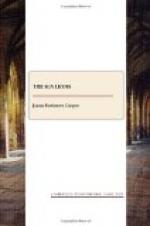Suffolk was settled originally by emigrants from New England, and the character of its people is, to this hour, of modified New England habits and notions. Now, one of the marked peculiarities of Connecticut is an indisposition to part with anything without a quid pro quo. Those little services, offerings, and conveniences that are elsewhere parted with without a thought of remuneration, go regularly upon the day-book, and often reappear on a ‘settlement,’ years after they have been forgotten by those who received the favours. Even the man who keeps a carriage will let it out for hire; and the manner in which money is accepted, and even asked for by persons in easy circumstances, and for things that would be gratuitous in the Middle States, often causes disappointment, and sometimes disgust. In this particular, Scottish and Swiss thrift, both notorious, and the latter particularly so, are nearly equalled by New England thrift; more especially in the close estimate of the value of services rendered. So marked, indeed, is this practice of looking for requitals, that even the language is infected with it. Thus, should a person pass a few months by invitation with a friend, his visit is termed ‘boarding;’ it being regarded as a matter of course that he pays his way. It would scarcely be safe, indeed, without the precaution of “passing receipts” on quitting, for one to stay any time in a New England dwelling, unless prepared to pay for his board. The free and frank habits that prevail among relatives and friends elsewhere, are nearly unknown there, every service having its price. These customs are exceedingly repugnant to all who have been educated in different notions; yet are they not without their redeeming qualities, that might be pointed out to advantage, though our limits will not permit us, at this moment, so to do.
Little did Mary Pratt suspect the truth; but habit, or covetousness, or some vague expectation that the girl might yet contract a marriage that would enable him to claim all his advances, had induced the deacon never to bestow a cent on her education, or dress, or pleasures of any sort, that the money was not regularly charged against her, in that nefarious work that he called his “day-book.” As for the self-respect, and the feelings of caste, which prevent a gentleman from practising any of these tradesmen’s tricks, the deacon knew nothing of them. He would have set the man down as a fool who deferred to any notions so unprofitable. With him, not only every man, but every thing “had its price,” and usually it was a good price, too. At the very moment when our tale opens there stood charged in his book, against his unsuspecting and affectionate niece, items in the way of schooling, dress, board, and pocket-money, that amounted to the considerable sum of one thousand dollars, money fairly expended. The deacon was only intensely mean and avaricious, while he was as honest as the day. Not a cent was overcharged; and to own the truth, Mary was so great a favourite with him, that most of his charges against her were rather of a reasonable rate than otherwise.




